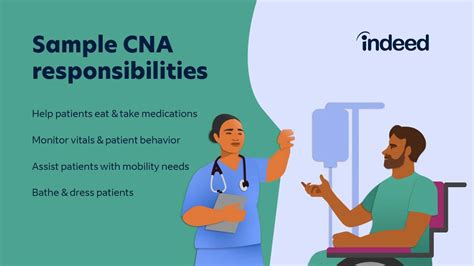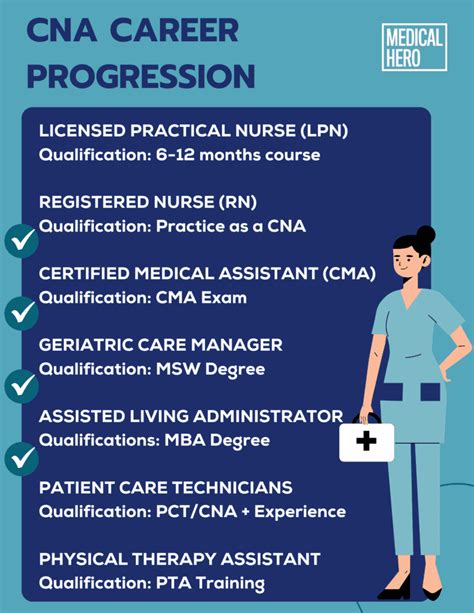Intro
Embark on a fulfilling career as a Certified Nursing Assistant (CNA). Explore CNA nursing assistant jobs, responsibilities, and requirements. Discover the rewards of working in healthcare, assisting patients, and collaborating with medical professionals. Learn about certification programs, job outlook, and growth opportunities in this in-demand field.
The demand for healthcare professionals has never been higher, and CNA (Certified Nursing Assistant) jobs are no exception. As a vital part of the healthcare team, CNAs play a crucial role in providing quality patient care, making it a rewarding career path for those who are passionate about helping others.

CNA jobs offer a sense of fulfillment and satisfaction that comes from making a positive impact on people's lives. Whether you're working in a hospital, nursing home, or long-term care facility, as a CNA, you'll have the opportunity to build meaningful relationships with patients, families, and healthcare teams.
What is a CNA, and What Do They Do?
A Certified Nursing Assistant (CNA) is a healthcare professional who works under the supervision of a licensed nurse to provide basic care and support to patients. CNAs are responsible for a range of tasks, including:
- Assisting patients with daily living activities, such as bathing, dressing, and grooming
- Taking vital signs, such as temperature, blood pressure, and pulse
- Helping patients with mobility and transfers
- Providing emotional support and comfort to patients and families
- Assisting with medical procedures and treatments
- Maintaining patient records and reporting any changes or concerns to the nursing team
CNA Job Requirements and Qualifications
To become a CNA, you'll need to complete a state-approved training program and pass a certification exam. The requirements for CNA certification vary by state, but most programs include:
- Completing a minimum of 75 hours of training, including classroom and clinical instruction
- Passing a certification exam, such as the National Nurse Aide Assessment Program (NNAAP)
- Maintaining certification through continuing education and professional development
In addition to certification, many employers require CNAs to have:
- A high school diploma or equivalent
- A valid state ID and social security number
- A background check and TB test
- Basic life support certification (BLS)
CNA Job Opportunities and Career Advancement
CNA jobs are in high demand, with the Bureau of Labor Statistics predicting a 9% growth in employment opportunities through 2028. As a CNA, you'll have opportunities to work in a variety of settings, including:
- Hospitals and health systems
- Nursing homes and long-term care facilities
- Assisted living facilities and adult day care programs
- Home healthcare agencies
- Rehabilitation centers and hospices
With experience and additional education, CNAs can advance to roles such as:
- Licensed Practical Nurse (LPN) or Licensed Vocational Nurse (LVN)
- Registered Nurse (RN)
- Nurse educator or instructor
- Healthcare administrator or manager

CNA Salary and Benefits
CNA salaries vary by location, employer, and level of experience, but the median hourly wage for CNAs in the United States is around $15-$20 per hour. Benefits for CNAs may include:
- Health, dental, and vision insurance
- Paid time off and holidays
- Retirement plans and pension programs
- Continuing education and professional development opportunities
- Flexible scheduling and shift differentials
Why Become a CNA?
Becoming a CNA can be a rewarding and challenging career path for those who are passionate about helping others. As a CNA, you'll have the opportunity to:
- Make a positive impact on patients' lives
- Build meaningful relationships with patients, families, and healthcare teams
- Develop valuable skills and experience in the healthcare industry
- Advance to higher-paying roles with additional education and experience
- Enjoy a sense of fulfillment and satisfaction in your work

Getting Started as a CNA
If you're interested in becoming a CNA, here are some steps to get started:
- Research state-approved training programs in your area
- Meet with a career counselor or advisor to discuss your goals and options
- Apply for financial aid or scholarships to support your education
- Complete your training program and certification exam
- Apply for CNA jobs in your area and start building your career
Conclusion
CNA jobs offer a rewarding and challenging career path for those who are passionate about helping others. With a strong demand for healthcare professionals, CNAs can enjoy job security, opportunities for advancement, and a sense of fulfillment in their work. If you're interested in becoming a CNA, start by researching training programs and certification requirements in your area.
What is the average salary for a CNA?
+The average salary for a CNA varies by location, employer, and level of experience, but the median hourly wage for CNAs in the United States is around $15-$20 per hour.
What are the requirements for CNA certification?
+To become a CNA, you'll need to complete a state-approved training program and pass a certification exam. The requirements for CNA certification vary by state, but most programs include completing a minimum of 75 hours of training and passing a certification exam, such as the National Nurse Aide Assessment Program (NNAAP).
What are the benefits of becoming a CNA?
+Becoming a CNA can be a rewarding and challenging career path for those who are passionate about helping others. As a CNA, you'll have the opportunity to make a positive impact on patients' lives, build meaningful relationships with patients, families, and healthcare teams, and develop valuable skills and experience in the healthcare industry.
